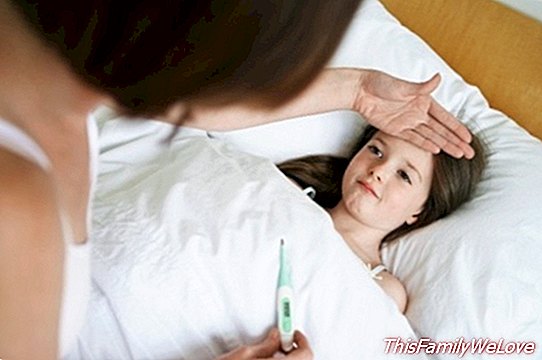What to do if your child has a fever


During the winter temperature changes are frequent, which favor virus diseases in the children of the house. They are typical of winter, some diseases such as colds, flu, tonsillitis and bronchitis that usually occur with fever. The fever It is a very frequent symptom in the first years of children's lives and it is essential to know what to do if your child has a fever
The rise in temperature facilitates the action of the body's defenses against bacteria and viruses that cause infections. Therefore, it is not necessary to treat the fever and try to lower it to the usual temperature. On the other hand, it is recommended relieve discomfort that the fever can produce the child and make him feel better.
When faced with a child with a fever, the most important thing is to know What is the cause and be aware of those symptoms that indicate problems and the convenience of consulting the pediatrician.
Tips to treat fever in children
1. Fever is not a disease, is a defense mechanism of the organism against infections, both those caused by viruses and bacteria.
2. Fever by itself does not cause harm cerebral, neither blindness, deafness, nor death.
3. Some children with a certain predisposition may have febrile seizures, but the treatment of fever does not prevent these febrile convulsions. We should never administer medications to lower fever for this purpose.
4. Febrile children should be treated only when the fever is accompanied by malaise or pain Ibuprofen and acetaminophen have the same efficacy to treat pain and their dosing should be done based on the child's weight and not on age. The combination or alternation of ibuprofen and paracetamol It's not advisable.
5. The use of wet cloths, rubbing alcohol, stripping children, showers or baths for the treatment of fever is discouraged.
6. Do not warm or undress too much to the child with fever.
7. The child with fever should be well hydrated. You have to offer liquids frequently and make sure they have carbohydrates (fruit juices, smoothies, porridge, etc.).
8. The use of paracetamol or ibuprofen is not advisable after vaccination to prevent febrile or local reactions.
9. Neither the amount of fever nor the descent of it after administering ibuprofen or paracetamol serve to guide on the severity of the infection.
Signs that we must watch when the fever rises
During episodes of fever, we must be vigilant and observe some signs that can warn us of the clinical worsening of the child and the need to urgently consult the pediatrician:
- Stains on the skin, dark red or purple, They do not disappear when stretching the surrounding skin.
- Decay, irritability or excessive crying and hard to calm down.
- Rigidity of the neck
- Convulsion or loss of knowledge.
- Difficulty breathe (marks the ribs and sinks the sternum, they are heard as whistles when breathing, breathing very fast, agitated, etc.).
- Vomiting and / or persistent or very abundant diarrhea that causes dehydration (dry tongue, absence of saliva, sunken eyes, etc.).
- If you do not urinate or urine is scarce.
- Always requires urgent consultation fever in a child under 3 months.
Marisol Nuevo Espín




